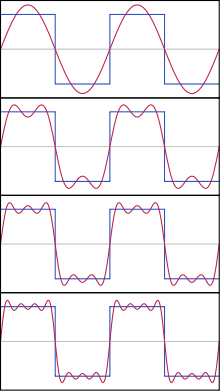Fourier series
See also: Fourierseries
English

The first four partial sums of the Fourier series decomposition of a square wave
Etymology
Named after French mathematician and physicist Joseph Fourier (1768-1830), who pioneered research into such series and their application to problems of heat transfer and vibration.
Noun
Fourier series (plural Fourier series)
- (mathematics, mathematical analysis) Any series resulting from the decomposition of a periodic function into terms involving cosines and sines (or, equivalently, complex exponentials).
- 1951 [Blackie & Son], R. C. H. Young (translator), Konrad Knopp, Theory and Application of Infinite Series, [1947, Konrad Knopp, Theorie und Anwendung der unendlichen Reihen, 4th Edition], 1990, Dover, Unabridged unaltered reprint of 2nd English Edition, page 493,
- As we have seen (pp. 369—370), the question of the necessary and sufficient conditions under which the Fourier series of an integrable function converges and represents the given function is one which presents very great difficulties.
- 2001, David Cruz-Uribe (translator), Javier Duoandikoetxea Zuazo, Fourier Analysis, [1995, Javier Duoandikoetxea Zuazo, Análisis de Fourier], American Mathematical Society, page 20,
- There are excellent discussions of Fourier series and integrals in Katznelson [10] and Dym and McKean [4]. The book by R. E. Edwards [5] is an exhaustive study of Fourier series from a more modern perspective.
- 2006, K. F. Riley, M. P. Hobson, S. J. Bence, Mathematical Methods for Physics and Engineering: A Comprehensive Guide, Cambridge University Press, 3rd Edition, page 415,
- Unlike Taylor series, a Fourier series can describe functions that are not everywhere continuous and/or differentiable.
- 1951 [Blackie & Son], R. C. H. Young (translator), Konrad Knopp, Theory and Application of Infinite Series, [1947, Konrad Knopp, Theorie und Anwendung der unendlichen Reihen, 4th Edition], 1990, Dover, Unabridged unaltered reprint of 2nd English Edition, page 493,
Derived terms
Related terms
- Fourier analysis
- Fourier integral
- Fourier transform
Translations
series of cosine and sine functions
|
|
Further reading



This article is issued from
Wiktionary.
The text is licensed under Creative
Commons - Attribution - Sharealike.
Additional terms may apply for the media files.